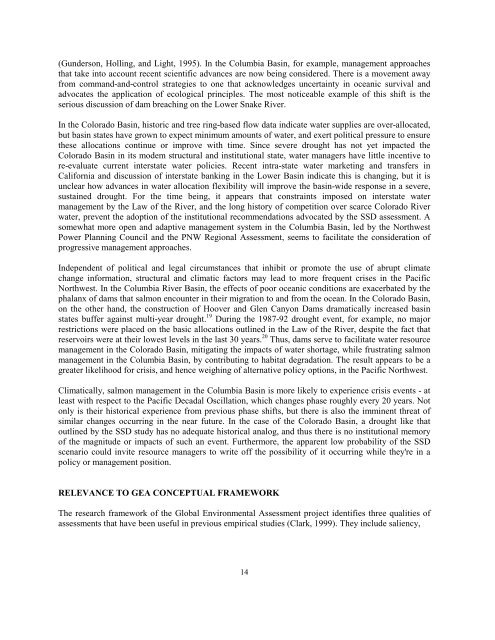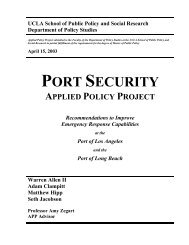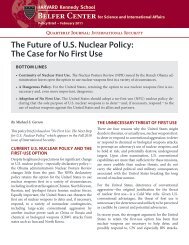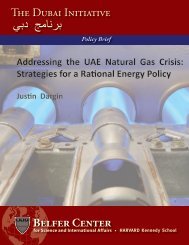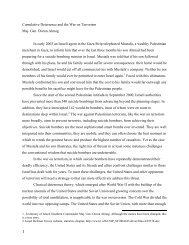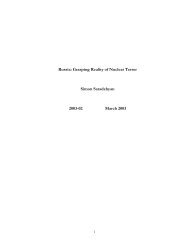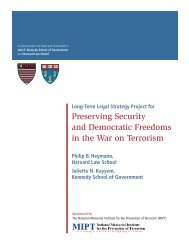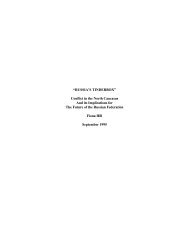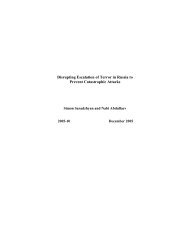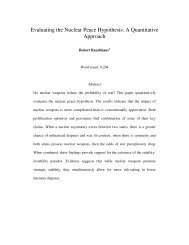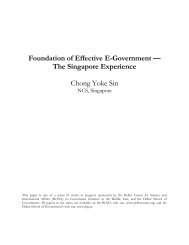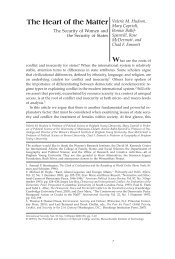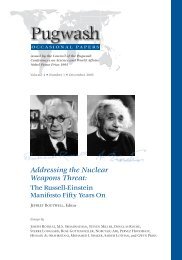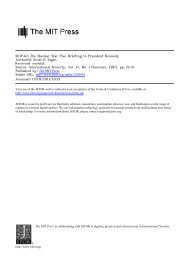Global Environmental Assessment Project - Belfer Center for ...
Global Environmental Assessment Project - Belfer Center for ...
Global Environmental Assessment Project - Belfer Center for ...
Create successful ePaper yourself
Turn your PDF publications into a flip-book with our unique Google optimized e-Paper software.
(Gunderson, Holling, and Light, 1995). In the Columbia Basin, <strong>for</strong> example, management approaches<br />
that take into account recent scientific advances are now being considered. There is a movement away<br />
from command-and-control strategies to one that acknowledges uncertainty in oceanic survival and<br />
advocates the application of ecological principles. The most noticeable example of this shift is the<br />
serious discussion of dam breaching on the Lower Snake River.<br />
In the Colorado Basin, historic and tree ring-based flow data indicate water supplies are over-allocated,<br />
but basin states have grown to expect minimum amounts of water, and exert political pressure to ensure<br />
these allocations continue or improve with time. Since severe drought has not yet impacted the<br />
Colorado Basin in its modem structural and institutional state, water managers have little incentive to<br />
re-evaluate current interstate water policies. Recent intra-state water marketing and transfers in<br />
Cali<strong>for</strong>nia and discussion of interstate banking in the Lower Basin indicate this is changing, but it is<br />
unclear how advances in water allocation flexibility will improve the basin-wide response in a severe,<br />
sustained drought. For the time being, it appears that constraints imposed on interstate water<br />
management by the Law of the River, and the long history of competition over scarce Colorado River<br />
water, prevent the adoption of the institutional recommendations advocated by the SSD assessment. A<br />
somewhat more open and adaptive management system in the Columbia Basin, led by the Northwest<br />
Power Planning Council and the PNW Regional <strong>Assessment</strong>, seems to facilitate the consideration of<br />
progressive management approaches.<br />
Independent of political and legal circumstances that inhibit or promote the use of abrupt climate<br />
change in<strong>for</strong>mation, structural and climatic factors may lead to more frequent crises in the Pacific<br />
Northwest. In the Columbia River Basin, the effects of poor oceanic conditions are exacerbated by the<br />
phalanx of dams that salmon encounter in their migration to and from the ocean. In the Colorado Basin,<br />
on the other hand, the construction of Hoover and Glen Canyon Dams dramatically increased basin<br />
states buffer against multi-year drought. 19 During the 1987-92 drought event, <strong>for</strong> example, no major<br />
restrictions were placed on the basic allocations outlined in the Law of the River, despite the fact that<br />
reservoirs were at their lowest levels in the last 30 years. 20 Thus, dams serve to facilitate water resource<br />
management in the Colorado Basin, mitigating the impacts of water shortage, while frustrating salmon<br />
management in the Columbia Basin, by contributing to habitat degradation. The result appears to be a<br />
greater likelihood <strong>for</strong> crisis, and hence weighing of alternative policy options, in the Pacific Northwest.<br />
Climatically, salmon management in the Columbia Basin is more likely to experience crisis events - at<br />
least with respect to the Pacific Decadal Oscillation, which changes phase roughly every 20 years. Not<br />
only is their historical experience from previous phase shifts, but there is also the imminent threat of<br />
similar changes occurring in the near future. In the case of the Colorado Basin, a drought like that<br />
outlined by the SSD study has no adequate historical analog, and thus there is no institutional memory<br />
of the magnitude or impacts of such an event. Furthermore, the apparent low probability of the SSD<br />
scenario could invite resource managers to write off the possibility of it occurring while they're in a<br />
policy or management position.<br />
RELEVANCE TO GEA CONCEPTUAL FRAMEWORK<br />
The research framework of the <strong>Global</strong> <strong>Environmental</strong> <strong>Assessment</strong> project identifies three qualities of<br />
assessments that have been useful in previous empirical studies (Clark, 1999). They include saliency,<br />
14


